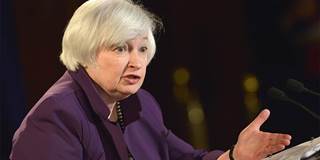The prospect that the US Federal Reserve will start exiting zero policy rates later this year has fueled growing fear of volatility in emerging economies’ currency, bond, and stock markets. But, with a few exceptions lacking systemic importance, widespread distress and crises need not occur.
NEW YORK – The prospect that the US Federal Reserve will start exiting zero policy rates later this year has fueled growing fear of renewed volatility in emerging economies’ currency, bond, and stock markets. The concern is understandable: When the Fed signaled in 2013 that the end of its quantitative-easing (QE) policy was forthcoming, the resulting “taper tantrum” sent shock waves through many emerging countries’ financial markets and economies.

NEW YORK – The prospect that the US Federal Reserve will start exiting zero policy rates later this year has fueled growing fear of renewed volatility in emerging economies’ currency, bond, and stock markets. The concern is understandable: When the Fed signaled in 2013 that the end of its quantitative-easing (QE) policy was forthcoming, the resulting “taper tantrum” sent shock waves through many emerging countries’ financial markets and economies.